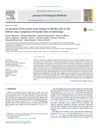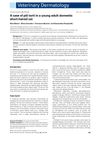 8 citations,
March 2020 in “Dermatologic Therapy”
8 citations,
March 2020 in “Dermatologic Therapy” The new hair loss treatment kit was safe and improved hair growth without any adverse effects.
[object Object]  March 2024 in “International Research Journal of Modernization in Engineering Technology and Science”
March 2024 in “International Research Journal of Modernization in Engineering Technology and Science” The herbal shampoo made hair shinier, smoother, and softer without side effects.
 9 citations,
April 1986 in “Postgraduate Medicine”
9 citations,
April 1986 in “Postgraduate Medicine” Hair loss has many causes and treatments, and losing some hair daily is normal; proper diagnosis is key, and minoxidil can help treat it.
 73 citations,
July 2016 in “Cosmetics”
73 citations,
July 2016 in “Cosmetics” Mushrooms have beneficial properties for skin and hair care products and have great potential for future cosmetic use.
 November 2020 in “Bali Medical Journal”
November 2020 in “Bali Medical Journal” PRP may help hair growth in alopecia areata without major side effects, but more research is needed.
 March 2013 in “Revista Brasileira de Cirurgia Plástica”
March 2013 in “Revista Brasileira de Cirurgia Plástica” Using platelet growth factors can improve hair density in transplants, especially for those with fine hair.
 9 citations,
November 2012 in “Biomolecules & therapeutics”
9 citations,
November 2012 in “Biomolecules & therapeutics” A compound from brown algae boosts the production of a certain inflammatory substance in skin cells.
 6 citations,
June 2021 in “Developmental biology”
6 citations,
June 2021 in “Developmental biology” Dermal EZH2 controls skin cell development and hair growth in mice.
[object Object]  June 2023 in “Medical records-international medical journal”
June 2023 in “Medical records-international medical journal” Decreased IGF-1R expression may contribute to sacrococcygeal pilonidal sinus development.
 480 citations,
August 2014 in “Nature Biotechnology”
480 citations,
August 2014 in “Nature Biotechnology” Changing the environment around stem cells could help tissue repair, but it's hard to be precise and avoid side effects.
 84 citations,
March 2010 in “Infectious Disease Clinics of North America”
84 citations,
March 2010 in “Infectious Disease Clinics of North America” The document concludes that rapid identification, isolation, and strict infection control are crucial to manage SARS outbreaks.
74 citations,
November 2000 in “Archives of Dermatology” Salicylic acid can safely exfoliate and regenerate skin without causing inflammation.
 11 citations,
September 2016 in “Journal of virological methods”
11 citations,
September 2016 in “Journal of virological methods” Rabies virus was found in specific skin cells of rabid dogs' muzzles, suggesting these cells could help diagnose rabies.
 24 citations,
May 2016 in “Stem Cell Reviews and Reports”
24 citations,
May 2016 in “Stem Cell Reviews and Reports” The document concludes that understanding how adult stem and progenitor cells move is crucial for tissue repair and developing cell therapies.
 December 2022 in “The journal of pediatrics/The Journal of pediatrics”
December 2022 in “The journal of pediatrics/The Journal of pediatrics” A young girl's foot lesion was actually a rare condition caused by a hair fragment under the skin, not a parasite.
 2 citations,
November 2003 in “Humana Press eBooks”
2 citations,
November 2003 in “Humana Press eBooks” Hair follicle cells can help heal wounds and study skin diseases.
 176 citations,
April 2011 in “Science”
176 citations,
April 2011 in “Science” Hair stem cell regeneration is controlled by signals that can explain different hair growth patterns and baldness.
 75 citations,
September 2017 in “Developmental biology”
75 citations,
September 2017 in “Developmental biology” The circadian clock influences the behavior and regeneration of stem cells in the body.
 30 citations,
April 2018 in “Experimental Dermatology”
30 citations,
April 2018 in “Experimental Dermatology” The article concludes that developing in vitro models for human hair structures is important for research and reducing animal testing, but there are challenges like obtaining suitable samples and the models' limitations.
 6 citations,
February 2013 in “Veterinary Dermatology”
6 citations,
February 2013 in “Veterinary Dermatology” A young cat had a rare hair condition with twisted hair shafts but stayed healthy.
 1 citations,
January 2017 in “Springer eBooks”
1 citations,
January 2017 in “Springer eBooks” Flavonoids and Nod factors are key for legume plant growth and could help in sustainable farming.
May 2018 in “The journal of immunology/The Journal of immunology” Mutations in the FOXN1 gene cause severe immune issues but don't affect hair and nails.
22 citations,
March 2021 in “Materials Today Bio” Scaffold-based strategies show promise for regenerating hair follicles and teeth but need more research for clinical use.




















